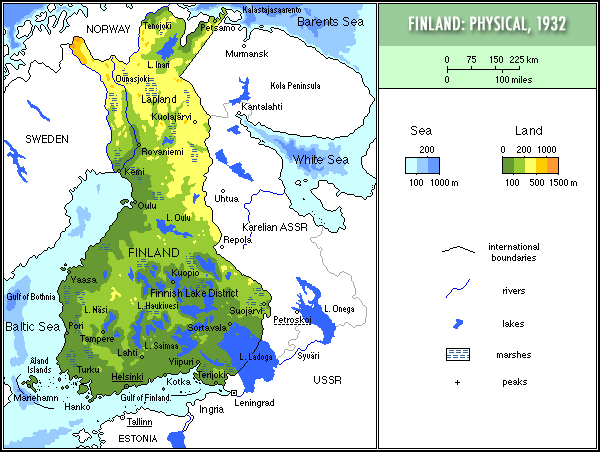@Narvik:
The main reason is ….terrain…that favor the defenders.
Finland is all lakes, swamps and marshes in the summer, and arctic cold, snow and ice in the winter, and it is a challenge to make any kind of military offensive operations in this environment, and to establish a supply line is almost impossible. But to defend is very easy, since the aggressor is forced to attack through narrow bottlenecks, with the lakes as natural flank protection. All the campaigns from 1500 to today have been done in the winter, since the marshes are impassable during summer, and they say Finland would have won the war if it had last one more week, because the rain season would have saved them. I live in Norway, and it is the opposite here, during winter the mountains are impassable, so you have to attack us during summer. But you must attack through a narrow pass, that is heavily defended, so you need a million men, and we defend with 100 000 and still win.
In the poll you can choose between poor attackers or poor defenders. I say none of them were poor nor great. They were just regular soldiers. The Fins had two weeks of military training, the Russians a lot more. But the decisive difference was, that the Nordic people like Fins, Norwegians and Swedes are born with ski on our feet. We learn skiing before we learn walking, and we are used to cold and long winter, we love the snow and out door camping. Most of the Russian attackers come from big cities or Ukraine, they were not familiar with snow and skiing, so they had a biig disadvantage even before the battle started.
To prove that it is the terrain that favor the defenders, just look at the attacks that went the other way. Two weeks after Barbarossa had started, a big German army tried to attack Russia from the North. The two week initial delay happened because it was difficult for the Germans to track a supply line through the mountains of Norway and marshes of Finland. 70 years ago during WWII we were badlands and wilderness and did not got the roads and railways we have today, so the supply had to arrive the front on horse back. Now this supply issue should be a warning to the Germans, but they did not get the point so they attacked Russia anyway. The great Lappland Army would never reach Murmansk nor Leningrad, as it was stopped at the river Litza just a few miles in at the Russian territory. Like the million men strong Red ARmy with heavy tanks like the KV1 had been stopped by 200 000 Finnish soldiers with rifles in 1939, exactly the same happened to the million men strong and heavy armed crack German SS and mountain troops, as they too were stopped by two light Russian divisions. It turned out that Murmansk and Leningrad were surrounded by marshes too. And even if the elite SS and gebirgsjeger managed to struggle their way through the marshes, the supply didn’t follow, so the attack halted.
edit, oh and I forgot to tell about the ambush. Finland was forest too, and when the heavy Russian army with tanks and trucks come, they were pretty much stuck on the few narrow roads. So they got ambushed by Fins on ski. The long Russian columns got stopped in front by dug in Fins at bottlenecks, and then other Fins ambushed the rear, and cut the columns into a lot of small pockets, cut off from supply, starving, freezing and after days or weeks, attacked by Finnish snipers.
Very good post.
Just to add to what you’ve written: Stalin had concluded the Red Army had fought poorly during the Winter War. (Nor was he alone in that opinion.) To correct the situation, it was decided to change the Red Army to a new doctrine. When the Germans invaded the Soviet Union in 1941, the Red Army was in the midst of transitioning from its old to its new doctrine. That confusion may have been one of the reasons the Germans were able to achieve a 10:1 exchange ratio during Operation Barbarossa.
By 1943, German soldiers were only 3 - 4 times as combat-effective as their Soviet counterparts. (There were also times–such as the Battle of Stalingrad–when the Soviets were able to come very close to achieving a 1:1 exchange ratio.) Given that the Germans were more combat-effective than the Soviets, it’s very possible the Finns were more combat-effective as well.
The great Lappland Army would never reach Murmansk nor Leningrad,
Von Manstein expressed frustration with Germany’s failure to take Leningrad. He felt the opportunity to take the city was there, and that it had been wasted. The opportunity had been fleeting, because the Red Army was soon able to bring large numbers of reinforcements to the area.
Like the million men strong Red Army with heavy tanks like the KV1 had been
stopped by 200 000 Finnish soldiers with rifles in 1939
There’s an interesting story about that. Soviet foreign minister Molotov had cynically denied that the Soviet Union was invading Finland at all. Instead, he claimed that Soviet forces were merely present to deliver humanitarian aid to the Finns.
The Finnish response to this was, “Molotov, if that’s your idea of ‘humanitarian aid,’ we’ll return the favor.” The crude anti-tank weapons hastily concocted by poorly armed Finnish forces were dubbed “cocktails for Molotov.”







